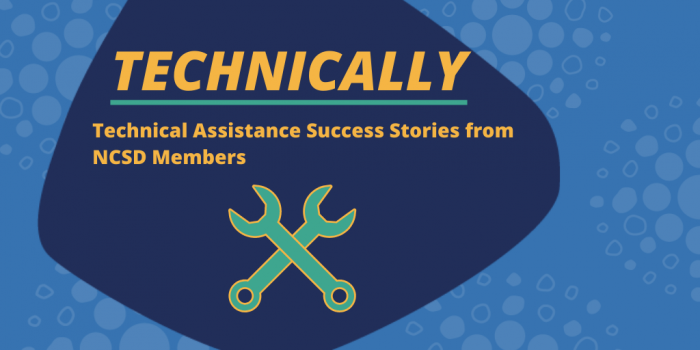Technically: Peer to Peer TA
In this week's edition of Technically, Linda J. Ferraro with the Connecticut Department of Public Health shares how NCSD facilitated peer to peer technical assistance to help develop their syphilis reactor desk processes, tools, and staff functions

What challenge was your STD program experiencing?
The Connecticut STD Control Program used to have a fully functional syphilis “reactor desk” to manage the review and follow-up needed for the complex syphilis laboratory and provider case reports received by the department. Unfortunately, due to position vacancies and hiring freezes, this reactor desk model was eliminated. The challenge for the STD Control Program was to try to establish this reactor desk model once again within the limited resources available, so reaching out to our colleagues in the Massachusetts Division of Sexually Transmitted Disease Prevention for technical assistance (TA) and guidance made sense as we were aware of their experience and expertise in the reactor desk model.
What specific technical assistance tools and resources were provided to you? How did you use the tools and resources to address your challenge?
Leandra Lacy from NCSD facilitated virtual meetings between our two programs to establish a dialogue and identify the areas where the Massachusetts program’s support and TA would be helpful. Leandra developed the agenda and coordinated the meetings on a virtual platform and facilitated the discussions to be productive and efficient, while also allowing for organic conversations, which ultimately identified additional topics for TA, such as HIV case prep work prior to field assignments and Data to Care activities. The original topic of the TA evolved, as did the involvement of additional programs and staff and several subsequent meetings were held to share information and ideas across programs, which were not anticipated but proved very beneficial.
The tools shared by our Massachusetts colleagues, such as protocols, procedures, and processes have been used as templates and foundations for revising and developing CT based syphilis reactor desk processes, tools, and staff functions. In addition, because of the expansion of the topics during the peer to peer TA, contacts and professional networking expanded, which will ultimately be fruitful down the road.
What are the next steps your STD program plans to take (or have already taken) to address your challenge?
The timing of this Peer-to-Peer TA sponsored by NCSD was serendipitous, as the exciting new funding for the PCHD Supplemental funding to build the DIS workforce and support systems will enable the CT program to formally build a fully functional syphilis reactor desk once again, using the resources and guidance provided by our colleagues in Massachusetts.
The Peer-to-Peer TA support provided by NCSD was a tremendous success for the CT STD Control Program and using the virtual platform for meetings cut down on time and travel expenses that would be required for a face-to-face meeting, so I highly recommend this service to all of my colleagues and greatly appreciate NCSD’s continued support!
Meet Linda J. Ferraro
Ms. Ferraro has been a dental hygienist for more than 30 years and began her career in private practice dentistry before pursuing a career in Public Health. She co-founded and directed the Dental Center of Stamford, not-for-profit dental clinic serving the underserved in Stamford, CT before joining the Connecticut Department of Public Health as the program coordinator for the Office of Oral Health and later became the State Dental Director. She went on to become a Public Health Services Manager for the CT DPH Drinking Water Section and is currently the Program Director for the state’s STD Control Program. Linda currently serves on the NCSD Public Policy Committee and is co-chair of the CT DPH Health and Safety Committee.
Linda received her degree in Dental Hygiene from Fones School of Dental Hygiene at the University of Bridgeport and her Bachelor in Science from Charter Oak State College.
NCSD Technical Assistance
Find more information about how NCSD can support your program on our Technical Assistance page.